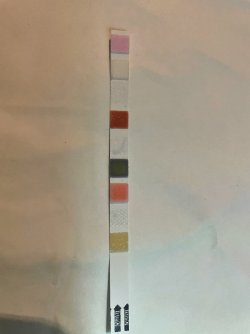Hi,
I have had my tank for a few months now and I find the water levels so confusing! Every time I do a wc, I always put a solution in but I am never sure I am doing the right one!! I have read about the nitrates and ammonia etc and when I went to the shop a while ago now and asked their advice, the guy said the best thing would be to buy real plants, which I did but I just came away even more confused as to what I needed to regularly add in the future! It would be amazing to have some knowledge and tips from experienced tank owners! I have attached a pic of my recent water reading, so any advice would be much appreciated!
Please note, I am not totally clueless and not putting my fish in any harm my fish are generally healthy and so far breeding like crazy! So I must be doing something right
my fish are generally healthy and so far breeding like crazy! So I must be doing something right 
 I just want to know the best way to maintain a healthy happy tank
I just want to know the best way to maintain a healthy happy tank 
Thanks!!!
FYI - I’m using the Tetra 6in1 test strips.
I have had my tank for a few months now and I find the water levels so confusing! Every time I do a wc, I always put a solution in but I am never sure I am doing the right one!! I have read about the nitrates and ammonia etc and when I went to the shop a while ago now and asked their advice, the guy said the best thing would be to buy real plants, which I did but I just came away even more confused as to what I needed to regularly add in the future! It would be amazing to have some knowledge and tips from experienced tank owners! I have attached a pic of my recent water reading, so any advice would be much appreciated!
Please note, I am not totally clueless and not putting my fish in any harm
Thanks!!!
FYI - I’m using the Tetra 6in1 test strips.


